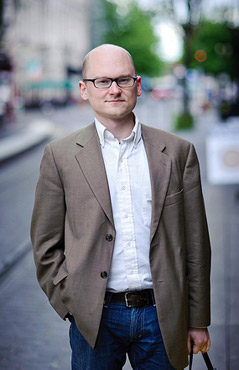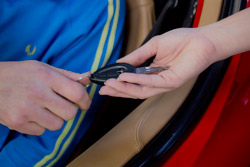What's the Magic Behind Transit-Friendly Portland?

Today marks the official launch of Getaround in Portland, and it’s hard not to wonder: what makes The City of Roses—or the entire state of Oregon for that matter—an ideal place for peer-to-peer car sharing?
To help us answer this burning question, we turned to Michael Andesen, founder and editor of Portland Afoot, an independent blog and magazine dedicated to “buses, bikes and low-car life.” Below are excerpts of our conversation.
Alternative transportation is mainstream
Most Portlanders don’t keep up with all the details of local transportation because they don’t have to. They just like the fact that it’s cheap and convenient and it’s safe to ride a bus or bike here.
 We’re the #1 metro area in the country for bike commuting and #7 for public transit use per person, right behind the big Eastern cities.
We’re the #1 metro area in the country for bike commuting and #7 for public transit use per person, right behind the big Eastern cities.
Portlanders tend to value happiness more than wealth
We’d rather spend our money on a beer, a book or a day on Mount Hood than export it to an auto company or oil mogul. Low-car life saves us a ton of money that we’ve got better uses for.
Portland is both lo-tech and hi-tech
Portland isn’t the most tech-driven city, in part because there hasn’t been much cash to throw around. In fact, when commercial car sharing started here in the 90s, it didn’t use fancy electronics—just shared keys.
The most important way we’ve embraced technology is being the first city to use open data for TriMet, our transit system. Now anyone from Google to your mom can create a mobile app that tells you which bus to board. This makes it easier for riders while saving the agency money on arrival displays at bus stops.
Not perfect, but getting there
In a perfect Portland, everyone would choose the vehicle for the job it does best: Bus or rail for crosstown commuting; cars for long errand runs, hauling and outdoor recreation; bikes for shorter errands and commutes; walking for routine trips for necessities and local entertainment.
A big reason we don’t do that today is that one of those four—the car—is way more expensive than the other three, so once we buy one we figure we may as well use it.
I’m excited about Getaround because it makes it easier to enjoy the financial rewards of low-car life.
Peer-to-peer car sharing has great potential
 Every new person who shares a car on Getaround or signs up to borrow one will add more value to the system than the previous person. Once everyone has access to a Getaround car within walking distance, it’ll be easy for lots of families to ditch their second or third car—which will also save taxpayers a ton of money on highway projects, pollution measures and so on.
Every new person who shares a car on Getaround or signs up to borrow one will add more value to the system than the previous person. Once everyone has access to a Getaround car within walking distance, it’ll be easy for lots of families to ditch their second or third car—which will also save taxpayers a ton of money on highway projects, pollution measures and so on.
If enough people start using peer-to-peer car sharing, low-car life can take off in any neighborhood.
I guess that makes it a perfect quest for Portland: If we all do this together, we’ll all save a bunch of money and we can all go out for a drink.



